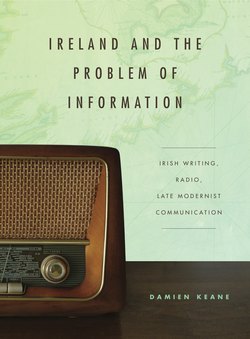Читать книгу Ireland and the Problem of Information - Damien Keane - Страница 8
На сайте Литреса книга снята с продажи.
ОглавлениеACKNOWLEDGMENTS
Among other things, this book is about relations, and it makes me happy finally to be in the position to offer public thanks to the people who have enabled me to get here. This project began at the University of Pennsylvania, where Jean-Michel Rabaté guided its progress with remarkable patience and superb insight; following the direction of his comment (“important: need more information”) on a dissertation footnote led me circuitously, and ultimately, to this book. Vicki Mahaffey has been serially perceptive not only of the project’s aims, but of what lies behind it. Jim English was an early advocate of my work, although I only recognized much later how fundamental his influence has been to its formation. For their support and counsel, I also wish to thank Margreta de Grazia, Elaine Freedgood, Heather Love, and Jo Park.
At Queen’s University, Belfast, the sharp eyes and good ears of Eamonn Hughes, Edna Longley, and the late Michael Allen continue to motivate my sense of critical engagement. All these years on, what I learned at Vassar College from Wendy Graham, Eamon Grennan, and Richard Severo remains central to my research and teaching, and I am especially grateful to them for encouraging me to see possibilities both near and distant.
To good friends made in Philadelphia, thanks for all the reasons I do not articulate often enough: Tim Albro, Jeff Allred, Hester Blum, Rachel Buurma, Matt Hart, Laura Heffernan, Rayna Kalas, Carolyn and Tommaso Lesnick, John Lessard, Matt Merlino, Cindy Port, Martha Schoolman, Kathy Lou Schultz, Hannah Wells, and Caitlin Wood.
Since arriving at Buffalo, I have been lucky in finding myself among a buoying and brilliant group of colleagues and friends: Jamie Currie, Molly Hutton, Michael Sayeau, Bill Solomon, Scott Stevens, Joe Valente, and Hershini Bhana Young. My students have been a persistent source of happiness, in particular Beth Blum, Stephen Boyd, J. C. Cloutier, Ronan Crowley, Julianna Crumlish, Amanda Duncan, Megan Faragher, John Hyland, Maura Pellettieri, and Alex Porco, from all of whom I have learned so much. I would be disgracefully remiss not to offer deepest thanks to the staff of the English Department, notably Wendy Belz, Sophia Canavos, and Nicole Lazaro, who make it all happen while also making me laugh.
My work would be impossible without the expertise and dedication of librarians, catalogers, archivists, and other library staff. In particular, I would like to thank Michael Basinski, Austin Booth, James Maynard, and Laura Taddeo of the University Libraries at the State University of New York at Buffalo.
More recently, I have been fortunate in meeting and working with new colleagues in a variety of forums, their acute responses to papers or presentations always offered in welcoming and intellectually enriching fashion. In particular, I would like to acknowledge the generosity of Paul Saint-Amour and Debra Rae Cohen, who, by their kindness and patience, have reminded me of important things I am prone to forget.
My two greatest intellectual experiences have come from being a part of collective endeavors: as a member of the Mods Group at Penn and as a fellow at the Society for the Humanities at Cornell. My year at Cornell was restorative and inspiring, due in large measure to the graciousness of the staff of the Society, its director Tim Murray, and the other fellows. I am especially indebted to Duane Corpis, Sarah Ensor, Tom McEnaney, and Jennifer Stoever.
I owe special and heartfelt thanks to Jeremy Braddock and Jon Eburne: their humor and dedication, their alacrity and hard work, have been sustaining me for years. This book owes a great deal to their intellectual fellowship, but I owe much more to their friendship.
An only child, I am very grateful to be a part of a large extended family, for whom I have the deepest respect and greatest love. I admire Tim Bowles for his humane perspective and profound belief in fairness. For their unstinting hospitality, sense of the world, and caustic humor, Rosemary Keane and Lisa Hogarty are wonderful, the sisters I never had. I simply marvel at my grandparents, Rose and Robert Keane and Frank Falcone, and their sense of history lies close to the heart of this book.
It makes me sad that my father, Michael, did not live to see this book. While we did not always see eye to eye, I hear echoes of his voice in its pages, just as I have heard his voice at some point during every day since his passing. Even so, I miss him terribly.
This book is dedicated to my mother, Donna, because of what she has taught me about dignity. As a single mother, she had to go through changes of which I was only dimly aware, but my strongest impression of growing up is of how much fun we had together. All my life she has made me know and feel that her love for me, her belief in me, are constant because of who I am. An honest Calabrese proverb (cui cerca trova e cui dorma si sonni) reminds me of her, among other reasons because it was she who provided that I sleep and thereby enabled me to dream. My respect for her is unbounded, and I love her because of who she is.
And, finally, to Gabriela Zoller, the loveliest person I know, for her very goodness in the world.
